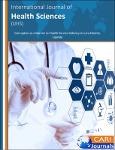| dc.identifier.citation | Okori, T., Obici, G., & Mwesigwa, D. (2023). Corruption as a Barrier to Health Service Delivery in Lira District, Uganda. International Journal of Health Sciences, 6(5). | en_US |
| dc.description.abstract | Purpose: This study set to investigate the relationship between corruption and health service delivery in the Lira district. Four objectives were targeted: determining the effect of corruption on health service delivery, examining corrupt actions, mechanisms of fighting corruption and challenges faced by the public in fighting corruption in Lira district.
Methodology: The study adopted a cross-sectional study design that employed a mixed-methods approach of both quantitative and qualitative methods. The study population consisted of 120 people, which comprised patients, in-charges of Ogur and Amach Health Center IV, village health teams, and some community leaders. The researcher used self-administered questionnaires to collect data, an interview guide, and a focus group discussion checklist for qualitative. The descriptive statistics (mean, frequency, and standard deviation) and the regression statistics were used to determine the effect of corruption on health service delivery.
Findings: The study found that corruption is associated with poor health service delivery in government health facilities. The regression coefficient of 0.97 and R-square of 0.97 reveal a strong correlation, which affects health service delivery by 38.2 percentage points. There are numerous corruption actions in health facilities, such as the selling of government drugs to patients; bribery, especially in the outpatient department; theft of health commodities; nepotism; favoritism; segregation at all service points in health facilities; and poor accountability. The mechanisms of fighting corruption in the health sector were community empowerment, community campaigns against corruption, reporting of suspected cases of corruption, tight supervision of government employees, and others. The challenges faced by the public in fighting against corruption were lack of community empowerment, a lack of information, unclear reporting channels for corrupt perpetrators, community ignorance, and fears of being mistreated by health workers, a weak political system, and bribery.
Unique contribution to theory, policy and practice: It was recommended that the government of Uganda should increase health worker salaries; tighten supervision of health workers at least weekly for effective monitoring; and a contract for fighting corruption be awarded to a private company because it worked well with the Apac anti-corruption coalition (TACC). This study contributes to the re-awakening of stakeholders on the depth of corruption in basic service delivery in Uganda. | en_US |

